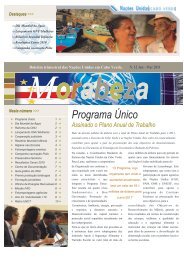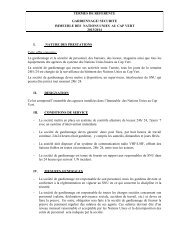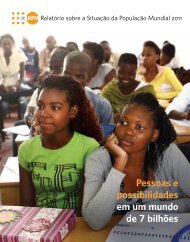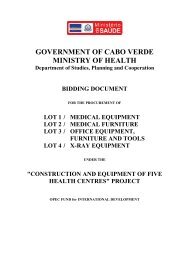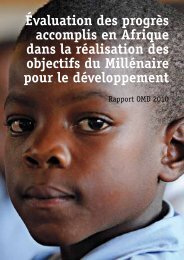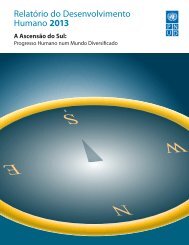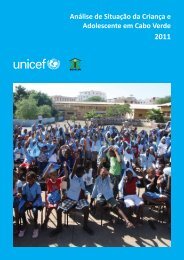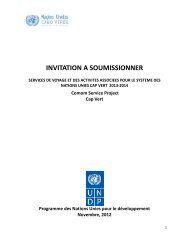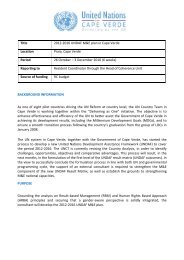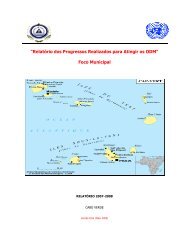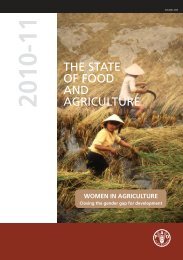PERSPECTIVEFacing the challenge:Reproductive health for HIV-positive adolescentsby Nyaradzayi Gumbonzvanda,General Secretary, WorldYoung Women’s ChristianAssociation“ Most adolescentsliving with HIVstruggle forrecognition, rights,protection andsupport.”In recent years, the global community has also madegreat strides to protect children and facilitate accessto education and health services for HIV-positivechildren and orphans. Organizations such as UNICEF,faith-based organizations and women’s networkssuch as the World Young Women’s ChristianAssociation (YWCA) have directed resources to traincaregivers in social protection policies and to defendchildren’s rights to information and dignity.Many of those living with HIV are adolescents. Theseyoung people do not fit any one model: They are inschool, out of school, living with foster parents, in stablefamilies, heading families or seeking employment.But all of them deserve a nurturing environment andcoherent support to make informed decisions abouttheir particular condition. In the last two years, theWorld YWCA conducted a series of dialogues withHIV-positive adolescent girls on the particular issuesthey face. We discovered three key challenges thatadolescents living with HIV contend with: disclosure,education and developing relationships.First, in terms of disclosure, many children and youngpeople are not informed of their HIV-positive status.Caregivers may not be prepared to tell them for avariety of reasons. Parents may feel an overwhelmingguilt for unintentionally ‘infecting’ their child, forexample, or they may dread answering questionsabout how HIV is transmitted. They may also wonderwhether their child will be able to live a ‘normal’ life,knowing she or he is HIV-positive, or have fulfillingrelationships (sexual or otherwise) in the future.Counselling for both caregiver and child is indispensablewhen handling disclosure.Some adolescents know their status but do notdisclose it to others because they fear rejection orexclusion. Both circumstances put young peopleat risk of transmitting HIV to others. In order tostop the spread of this virus, we must counteractprevailing stigma. It is imperative that policiesand programmes – especially those established bygovernments – provide safe spaces for adolescentsto feel comfortable disclosing their status, secure inthe knowledge that they will be supported.The second challenge is that comprehensiveinformation on reproductive health for HIV-positiveadolescents is still scarce. Health-care systems andfamily support networks lack the means to break downsuch information to show its relevance to a particularage group or gender. “Aunt, should I stop taking themedicine now that I have started my period?” asks15-year-old Tendai from Zimbabwe. Tendai was bornHIV-positive and worries that taking medication duringher period could result in side effects or adverselyaffect the chance of her having a child later in life.Local health-care workers and caregivers need trainingto provide answers to such questions about the fertilityrisks for HIV-positive adolescents. Providing educationand accessible information to people living with HIV ispivotal to eliminating the epidemic.The third challenge is developing relationships.Whether with friends or family, relationships arefraught with difficulty for young people living withHIV. UNICEF recently organized a dialogue with HIVpositiveadolescents in Zimbabwe. These wonderful,bright voices brought painful and piercing messages.Conscious of their HIV status, adolescents fear they maynever experience a sustainable romantic relationship.If they are blessed with a loving and understandingpartner, will the partner’s family accept them? If so, howdo they go about conceiving a child? In such resourcepoorcountries, what are the risks and options?It is the duty of governments to make sure medicationand services such as counselling are available toall those living with HIV, including young people.International organizations such as Save the Childrenand community groups such as Rozaria Memorial Trustmust join hands to enable HIV-positive adolescents toenjoy all their rights, especially their right to sexualand reproductive health. Most adolescents livingwith HIV struggle for recognition, rights, protectionand support. They seek advice and information, notjudgement. The sooner these adolescents’ questionsare answered, the sooner they will be empoweredwith the confidence that only knowledge can provide.As World YWCA General Secretary, NyaradzayiGumbonzvanda leads a global network of womenin 106 countries, reaching 25 million women andgirls. She previously served as Regional Director forthe United Nations Development Fund for Women(UNIFEM) and as a human rights officer with UNICEFin Liberia and Zimbabwe.28THE STATE OF THE WORLD’S CHILDREN 2011
More than 70 million adolescents of lower secondaryage are out of school, with sub-Saharan Africa themost affected regionThe overwhelming focus on achieving universal primaryeducation by 2015 may have led to the educational challengefor adolescents being understated. Reports repeatedlytalk about the ‘number of children out of school’ butrefer only to the number of children of primary age whoare out of school – currently 69 million. 28 Yet there arevirtually equal numbers of adolescents of lower secondaryage – almost 71 million, 29 which is around one in five ofthat total age group – who are also out of school, eitherbecause they have not completed their primary schoolingor because they have been unable to make the transitionto lower secondary school – or because they have simplydropped out of secondary education. Taking account ofadolescents, therefore, doubles the worldwide problem ofchildren out of school. Of these out-of-school adolescents,54 per cent are girls. The region most affected in thisrespect is sub-Saharan Africa, with 38 per cent of adolescentsout of school. 30There is a growing need to focus on the transition fromprimary to lower secondary school, which often provesparticularly difficult in developing countries. Some childrenare not transitioning to secondary school at typicalages while other children drop out entirely. For example,of lower-secondary-age adolescents in sub-Saharan Africa,39 per cent are still in primary school, repeating earliergrades or catching up after a late start. In sub-SaharanAfrica, 64 per cent of primary school students transition tosecondary school. 31 Of those adolescents who do transitionto secondary school, many do not make it to the uppersecondary. For developing countries, the upper secondarygross enrolment ratio stood at just 48 per cent in 2007,compared with 75 per cent at the lower secondary level. 32As more sub-Saharan African countries are reaching universalprimary education, they are expanding their educationgoals to universal basic education, which includes anelement of lower secondary as well as primary schooling.Ghana, for example, in 2007 established basic educationto include 11 years of schooling, including two years ofkindergarten, six years of primary school and three yearsof junior high school. 33The barriers to school attendance at secondary level arelargely similar to those at the primary level, but often evenmore entrenched. The cost of secondary schooling is oftenhigher than the cost of primary schooling and therefore moredifficult for families to afford; secondary schools are furtherfrom home, often requiring transportation; and the conflictbetween educational aspirations and the potential incomethat could be earned by a working adolescent is greater.Across the developing world, girls still lag behindboys in secondary school attendanceAt the global level, girls still lag behind boys in secondaryschool participation, with net enrolment at 53 per cent forboys and 48 per cent for girls for the period 2005–2009.Although girls lag behind boys generally, their disadvantageis not wholesale. Girl disadvantage is highest in the leastdeveloped countries, particularly in sub-Saharan Africa andSouth Asia. However, in the East Asia and Pacific and theLatin America and Caribbean regions, net attendance insecondary school is higher for girls than boys. 34Adolescent girls and boys face different challenges toschool attendance. Girls, especially poor girls, are lesslikely to attend secondary school due to the compoundingforms of disadvantage and discrimination they face,including domestic labour, child marriage, ethnic or socialexclusion and early pregnancy. 35 Boys may face psychosocialchallenges to school attendance. Adolescent boys tendto report lower satisfaction with school than girls. 36 Studiesshow that teenage boys tend to spend less time in academicactivities than girls, while lack of family involvement andthe influence of their peer group may also adversely affectboys’ levels of satisfaction and adjustment to school.Secondary education is critical to adolescentempowerment, development and protectionGirls’ secondary education remains critical to their development.The existence of secondary schools tends toimprove not only enrolment and completion in primaryschools but also the quality of the education they provide.Secondary education contributes to greater civic participationand helps to combat youth violence, sexual harassmentand human trafficking. It results in a range of longtermhealth benefits, including lower infant mortality, latermarriage, reduced domestic violence, lower fertility ratesand improved child nutrition. It functions as a long-termdefence against HIV and AIDS, and also acts to reducepoverty and foster social empowerment. 37Many countries in the developing world have made significantprogress in enrolling more girls in secondary schoolsince 1990, though the goal of gender parity remainsrealizing the rights of adolescents 29
- Page 2 and 3: © United Nations Children’s Fund
- Page 4 and 5: AcknowledgementsThis report was pro
- Page 7 and 8: THE STATE OF THE WORLD’S CHILDREN
- Page 9: GLobal challenges for adolescents 1
- Page 12 and 13: large cohort of unemployed youth, w
- Page 14 and 15: FOCUS ONEarly and late adolescenceR
- Page 16 and 17: ment and active participation. Disa
- Page 18 and 19: age at which individuals are legall
- Page 20 and 21: the rights of adolescents or to pro
- Page 22 and 23: The Convention was sufficiently ins
- Page 24 and 25: Adolescents are often consideredthe
- Page 26 and 27: HALLENGES ANDRealizing the rights o
- Page 28 and 29: FOCUS ONDemographic trends for adol
- Page 30 and 31: country are particularly serious, g
- Page 32 and 33: Gathering accurate data on adolesce
- Page 34 and 35: sexes, there is still a considerabl
- Page 38 and 39: FOCUS ONInequality in childhood and
- Page 40 and 41: ADOLESCENT VOICESAct responsibly:Nu
- Page 42 and 43: past decade, though not all of them
- Page 44 and 45: Yet other initiatives against child
- Page 46 and 47: PERSPECTIVEChernobyl 25 years later
- Page 48: Adolescents are deeply concernedabo
- Page 51 and 52: OPPORTUNITIESrisk of climate change
- Page 53 and 54: Poverty, unemploymentand globalizat
- Page 55 and 56: PERSPECTIVEThe effects of climate c
- Page 57 and 58: high-level competencies that are in
- Page 59 and 60: a window for possible economic deve
- Page 61 and 62: ADOLESCENT VOICESReclaim Tijuana:Pu
- Page 63 and 64: are exacerbating those risks, inclu
- Page 65 and 66: sentencing wherever possible, inclu
- Page 67 and 68: e stranded in poverty by conflict o
- Page 70 and 71: HALLENGES ANDOver the course of the
- Page 72 and 73: gated by age, disability, sex, ethn
- Page 74 and 75: FOCUS ONPreparing adolescents for a
- Page 76 and 77: the Ministry of Education, in colla
- Page 78 and 79: exactly ‘youth participation’ l
- Page 80 and 81: spaces as part of Aprendiz, the ‘
- Page 82 and 83: PERSPECTIVEAdolescent girls:The bes
- Page 84 and 85: ADOLESCENT VOICESFrom victims to ac
- Page 86 and 87:
ReferencesCHAPTER 11United Nations,
- Page 88 and 89:
19United Nations Children’s Fund,
- Page 90 and 91:
STATISTICAL TABLESEconomic and soci
- Page 92 and 93:
Under-five deaths (millions)Region
- Page 94 and 95:
STATISTICAL TABLESapproach is not t
- Page 96 and 97:
TABLE 1. BASIC INDICATORSCountries
- Page 98 and 99:
TABLE 1. BASIC INDICATORSUnder-5mor
- Page 100 and 101:
TABLE 2. NUTRITIONCountries and ter
- Page 102 and 103:
TABLE 2. NUTRITIONCountries and ter
- Page 104 and 105:
TABLE 3. HEALTHCountries and territ
- Page 106 and 107:
TABLE 3. HEALTH% of populationusing
- Page 108 and 109:
TABLE 4. HIV/AIDSCountries and terr
- Page 110 and 111:
TABLE 4. HIV/AIDSEstimatedadult HIV
- Page 112 and 113:
TABLE 5. EDUCATIONCountries and ter
- Page 114 and 115:
TABLE 5. EDUCATIONPrimary schoolNum
- Page 116 and 117:
TABLE 6. DEMOGRAPHIC INDICATORSCoun
- Page 118 and 119:
TABLE 6. DEMOGRAPHIC INDICATORSPopu
- Page 120 and 121:
TABLE 7. ECONOMIC INDICATORSCountri
- Page 122 and 123:
TABLE 7. ECONOMIC INDICATORSCountri
- Page 124 and 125:
TABLE 8. WOMENCountries andterritor
- Page 126 and 127:
TABLE 8. WOMENCountries andterritor
- Page 128 and 129:
TABLE 9. CHILD PROTECTIONChild labo
- Page 130 and 131:
TABLE 9. CHILD PROTECTIONChild labo
- Page 132 and 133:
Summary indicatorsAverages presente
- Page 134 and 135:
TABLE 10. THE RATE OF PROGRESSCount
- Page 136 and 137:
TABLE 10. THE RATE OF PROGRESSUnder
- Page 138 and 139:
TABLE 11. ADOLESCENTSCountries and
- Page 140 and 141:
TABLE 11. ADOLESCENTSAdolescents po
- Page 142 and 143:
TABLE 12. EQUITYCountries andterrit
- Page 144 and 145:
TABLE 12. EQUITYBirth registration
- Page 146 and 147:
AcronymsAIDSCEDAWDHSFGM/CGDPHIVIUCW
- Page 148:
United Nations Children’s Fund3 U



